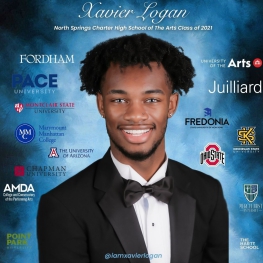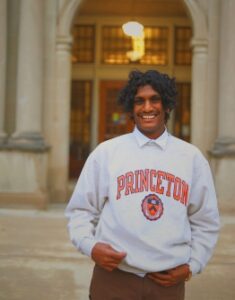After one of the most unpredictable admissions cycles, successful college admits from all over the U.S. have shared their tips and takeaways. 4 admits to Cornell, USC, Princeton, Emory, and Juilliard who beat the 90% + odds of denial talk about high school classes, test scores, scholarships, and getting help. Here’s a mid-series recap of our interview highlights.
This week, 5 incoming freshmen share:
- How college applicants aiming for choosy colleges should handle low test scores
- If it’s truly needed to overload on AP classes to get into selective colleges
- Why academic achievement is not the only or best way to get rewarded by colleges

Every 45-minute interview with a college admit reveals something different: a little-known essay tip, an effective email with an admissions counselor, a controversial decision that turned out okay like submitting a low test score.
These young men and women have just survived college apps — and not only made it out alive, but also made it out on top. Their memories are fresh and relevant. They haven’t forgotten the details of late nights on the Common App, the reactions to the coveted acceptance letter, the balancing of schoolwork with extracurriculars with essay writing.
Yet, now on the other side and getting ready to pack their bags for college, these outstanding high school grads have insight that even admissions officers don’t have: what it felt like to live first-hand through college admissions 2021 and succeed.
Here are some mid-series highlights from this admissions cycle’s top admits:
A low test score doesn’t mean an automatic denial — even at an Ivy League
“I put Cornell as one of my schools to send it to, not realizing that I would get a 23 on it, which is not the best. So I sent it anyway, because I figured, why not? They might be able to find a way to find your test scores anyways.” — Jessica Chang, Cornell admit
 Jessica, a Hawaiian student leader, got into Cornell. Sure, the statistics say it’s uncommon for applicants with low test scores to be seriously considered. But I highlight Jessica’ experience of getting into Cornell with a 23 ACT to remind the parents and students that low test scores shouldn’t bar an otherwise accomplished individual from applying.
Jessica, a Hawaiian student leader, got into Cornell. Sure, the statistics say it’s uncommon for applicants with low test scores to be seriously considered. But I highlight Jessica’ experience of getting into Cornell with a 23 ACT to remind the parents and students that low test scores shouldn’t bar an otherwise accomplished individual from applying.
Every college has an institutional priority, whether it’s recruiting a student from the underrepresented state of New Mexico, a student who identifies as Native American, a student who made it to the Olympics. When that institutional priority is met, test scores may not be as important.
If your family has the application fee funds and time and energy to apply, it’s worth a shot if your child has demonstrated other non-academic accomplishments.
Overloading on AP classes to get into choosy schools may not be worth it.
“I only took seven AP classes throughout my high school journey, and I think that that’s too many. I know one girl from my school went to Harvard last year, and she only took three AP classes.” — Justice Wooden, USC admit
 The common recommendation is to take as many AP classes as possible. Students do this, burn out, and sometimes don’t even get into their best fit colleges.
The common recommendation is to take as many AP classes as possible. Students do this, burn out, and sometimes don’t even get into their best fit colleges.
Justice is headed to USC and realized that 7 APs was overkill, especially for a student with an impressive performing arts background.
While most parents push their kids to max out on all APs, it’s usually because it gives them a sense of security that they’re doing everything they can to steer kiddo in the right direction.
But the sense of security may lead to consequences such as sleep deprivation, hatred of school, inability to concentrate, and the opportunity cost of blossoming as a dancer, musician, athlete, or whatever interest the child has.
Lessen the pressure on APs, do something outside of school, prevent burnout, and still get into choosy colleges like USC. Sounds pretty good!
Get recognition for your accomplishments by asking — not waiting for them.
“We should make a name for ourselves and not wait for someone to reach out. This year, I made $1.3 million in scholarships, and I got into Juilliard. My school principal doesn’t even know who I am.” — Xavier Logan, Juilliard admit
 I want Xavier’s story to remind applicants that we often spend too much time wanting to get rewarded by an existing body and waiting to be seen.
I want Xavier’s story to remind applicants that we often spend too much time wanting to get rewarded by an existing body and waiting to be seen.
Just like how corporate adults work toward a job title promotion, high schoolers want that first place trophy for Mock Trial or wait to be seen by their classroom teachers.
But we forget that gaining recognition doesn’t have to involve waiting to be noticed.
Xavier reminds us that we can get recognized by reaching out to the media ourselves, letting our teachers and principals know about our accomplishments, or establishing a web presence that shows the world our accomplishments.
Let your child get better at their passions or hobbies. They’ll get rewarded.
“Theater means so much to me but everyone says, ‘It’s just a hobby; you’re not going to make anything out of it.’ But I got money to go to Emory because of theater.” — Rachel Goldberg, Emory admit
 I often hear parents say things like “school must come first,” or “my child is a talented guitarist but there’s no future in guitar so he should drop it to focus on school.”
I often hear parents say things like “school must come first,” or “my child is a talented guitarist but there’s no future in guitar so he should drop it to focus on school.”
That’s not a problem, but Rachel’s story reminds us of the bright side of diving into arts or sports alongside academics. An Emory admit on a pre-med track, she got a scholarship for theater, not biology.
If your child is a superstar outside of school, the right college will reward them for their hobby accomplishments.
Help from others can lead to success.
“I felt like I could do it by myself. But I realized that I need other people around me to be successful…It was just a change in my mentality about getting help from others.” — Arav Jagroop, Princeton admit
 I also often hear parents say, “my kid should be independent and do this himself.” Or “college is around the corner. If she can’t handle applying on her own, she’s not capable of living independently at college.”
I also often hear parents say, “my kid should be independent and do this himself.” Or “college is around the corner. If she can’t handle applying on her own, she’s not capable of living independently at college.”
Independence at a young age is wonderful, but be careful not to confound “dependence” and “asking for help.”
Arav, a Princeton admit, realized that he needed help from others to succeed and enlisted a support group to encourage him throughout college apps.
He got into Princeton.
I highlighted this quote to remind us that help can appear different for everyone. Some teens need a full-on college counselor, some need freedom to socialize with friends during college app season, and some simply need a massage and a milkshake in between college interviews.
Getting help can lead to success.
Conclusion
Every student walks a unique path to college and no two paths are the same. We don’t need to copy Rachel and Jessica and Justice’s path. But we can take their experiences and realize that college acceptance letters will come even if we want to pursue our interests, stay mentally healthy, and avoid burnout.
Stay tuned for a brand new insider interview next week!
[/mepr-show]
